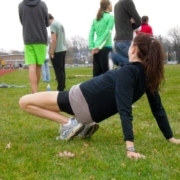“They Just Disappeared”: Beyond Anorexia in Runners
Post updated March 16, 2021, to improve clarity and readability.
We often picture eating disorders in the running world in the form of a frail girl crossing the finish line. There’s an assumption that this person will run into multiple stress fractures in the next few years. And that, that is how they will disappear from the ranks as quickly as they came.
Injury. Lack of energy. Infertility. We bring up these consequences of not eating enough, of becoming too thin. Meanwhile, the least-discussed part of this “disappearing act” is what you might call the other side of anorexia: binge eating disorder, a very common rebound effect from restricting calories or food groups.
Binge Eating Disorder
Just as serious as anorexia (and even more common), binge eating involves consuming vast quantities of food in a frantic, guilt-ridden manner. It prompts sufferers to eat foods they may have never touched before. It leaves them feeling guilt for days afterward. It often triggers a response to restrict again, which only makes binge eating worse.
Binge eating does not forgive. It does not replenish the athlete after one episode. The hunger and loss of control will feel so intense, so unlike their previous calculation of calories and measured meals, that an athlete may feel that their body is not properly equipped to eat food normally. This, in turn, can cause even tighter eating regimens. One may often restrict their calories or food groups repeatedly just to feel a sense of “normalcy,” to “fix” their problem. They struggle to eat as others do, only to experience the intense hunger yet again.
It’s a raging hunger, though reasonable given a restrictive eating past.
Personal Experience
Binge eating was not recognized in the Diagnostic and Statistical Manual for Mental Illness (DSM) until 2013. That was nearly two years after I realized binge eating was exactly what I was dealing with as a collegiate athlete. Struggling with something without a name made me trivialize my struggles. I often thought, “I just have no discipline,” “I wasn’t starving myself before, so I’m just being a baby,” and, “I’m just obsessed with food.” I thought that no other runner would “lose so much control” in a world of discipline, willpower, and mental strength.
The binges left me feeling guilty and ashamed. I also physically struggled to adapt to my new shape and weight. I wondered if I could only be happy when I was thinner and faster. I struggled with the loss of identity as a thinner runner. I believed my “lack of control” was a lack of “discipline” and “willpower.”
Beyond Weight Gain
Suffering from an injury from malnutrition is just one part of many disappearance stories. Struggling with emotions and the bingeing that may accompany a loss of running is another part that needs to be addressed. This will not only help those who feel they are suffering alone in their experience, but it can also help coaches to realize that this isn’t about how small someone appears.
We need to talk about binge eating because it is such a common aftermath of having dealt with anorexia. We continue to focus on how athletes get injured and “just disappear.” Let’s talk about where they “disappear” to. We must bring binge eating into the conversation. It’s time to show eating disorders in sports beyond anorexia, and that any athlete deserves help–especially when they seemingly “disappear.”
Left in the Dark
A healthy weight does not always equate to success and recovery. It does not always mean the sufferer is “well” again. We are failing athletes by only “looking” for eating disorders in the thinnest appearance.
Without this narrative, we are leaving many athletes in the dark. Athletes feel alone, ashamed, and afraid to speak out about behaviors rarely discussed. They often fear that exposing their weight gain at the hands of what they see as overconsumption of food will only spur comments about lack of discipline and willpower. This is a stigma society often associates with additional weight. This can be frustrating for athletes who have an incredible amount of discipline and willpower to train as they normally do.
Without this narrative, sufferers are confused about their own bodies, ashamed of their predicament, and left running in silence.









Going through this right now. Suffering nagging injuries and midnight binges. Can’t heal because I need to beat down the uncontrollable binge.
What can a runner do when loved ones and doctor only see the weight gain as healthy? It’s completely not, and they treat us like we are slow witted jack-a-ninnies.
I guess I see it as, the binge needs to happen–it’s part of your body’s response to get back to where it needs to be, or at least a response to the restriction it has endured. Everyone is different, but I realized the more I tried to fight the binge, the worse it became. It just had to run its course, and will run its course sooner/quicker(??) with less resistance. It doesn’t mean we should binge on anything and everything–I finally realized I could eat like my body needed, but I needed to work toward foods that were less processed. I also wrote down my hunger feelings so I could better read and understand my body again. It was a LONG process, but like I sort of said at the beginning, necessary.
I’ll probably address this question more in a YouTube video too . . . really good question.